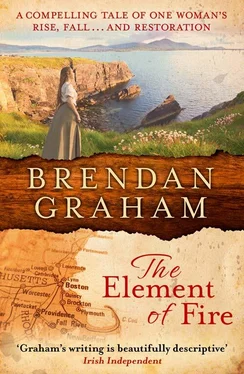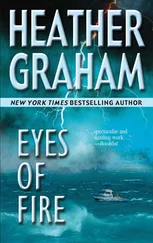1 ...6 7 8 10 11 12 ...20 ‘This is Patrick,’ she intervened. ‘Patrick, this is Mr Lavelle of whom I spoke … and this is Mary,’ Ellen introduced the nine-year-old image of herself. ‘And this is …’ she paused as Lavelle’s gaze transferred to the silent girl, ‘… this is Louisa, who has come with us to Boston.’ She saw the question still remain in his eyes. ‘We had to leave Katie behind … with Michael.’
He caught her arm, understanding at once. ‘Oh, I’m sorry, Ellen. So sorry – you’ve had so much of trouble … after everything else to …’ he faltered, unable to find the words.
‘Well, we’re here,’ she said simply. ‘At last, we’re here.’
‘And how is it in Ireland?’ Lavelle moved on the conversation.
They would talk later of Katie and this girl Louisa who, when he made to greet her, seemed not to notice. him. She was deficient of hearing, or speech, or both, he thought.
‘Ireland is poorly,’ Ellen answered him, ‘Ireland is lost entirely.’
‘And what of the Insurrection – the Young Irelanders – we read something of it in the Pilot ?’ he said, referring to the Archdiocese of Boston’s weekly newspaper.
‘The Insurrection failed – I brought you some newspapers, The Nation ,’ she answered. ‘There was much talk of it in Ireland and aboard ship. I have little interest in it. Now we are here and Ireland is …’ she turned her head seawards, ‘… there.’
He heard the weariness in her voice. God only knows what she had gone through to redeem her two remaining children.
‘Mr Peabody enquires after you frequently,’ he said, in an effort to brighten her up, knowing how much she enjoyed her dealings with the Jewish merchant.
‘Oh! And is he well himself, and the business – how is it?’ she asked.
‘Both Mr Peabody and the business continue to thrive,’ he told her with a certain amount of satisfaction, she noticed. Things must have gone better between him and Peabody, in her absence, than she had hoped for.
The children were agog at Boston’s Long Wharf, stretching, as Mary put it, ‘from the middle of the sea, to the middle of the town’.
‘City,’ corrected Patrick, showing he was a man of the world, not like his sister who knew nothing. ‘It’s a city!’
If Westport Quay swirled with all the varied elements of quayside life, then here, in Boston, it was as if the mixed ingredients of the whole world had collided together. Tea-ships, ice-ships, spice-ships. Syphilitic sailors, back from the South Seas, poxed and partially blind, bringing home with them ‘the ladies’ fever’ and the stale stench of flensed whales. In their midst stood sinless and sober-suited Bostonians cut from the finest old Puritan stock; anxious for merchandise, disgusted by this new influx of paupers and the sanitary evils accompanying them.
The hiring agents of the mill bosses sized up this fresh supply of factory fodder. ‘Labour!’ they hollered, to the sea of ‘green hands’. ‘Labour!’ they called, winking and smiling at the wide-eyed Irish girls. Seeking to seduce with smiles, as much as with dollars, those they considered ‘sober of habit, sound of limb and with good strong backs’ – as they had been instructed. One man’s ‘sanitary evil’, it seemed in America, was another’s ‘strong back’.
The children’s heads turned at every step, gawking at this and that, each new sight and sound of Boston a greater wonder to them than the one before. Like the gaudily bedecked sailors of various hue, reeking of spices and perfumes from the far reaches of the Orient, chattering in unintelligible tongues. Or a few freed slaves from the South silently bullocking the heavy cargo. She had to prevent them from staring.
‘But that man … he’s all black, what happened to him?’ Mary couldn’t contain herself.
‘He’s a Negro – from Africa,’ Ellen hushed her.
‘But will it rub off?’ Mary persisted.
‘Only if you shake hands with him, Mary,’ Lavelle cut in solemnly.
Mary’s eyes opened even wider, craning her neck to see this man who would change colour at a touch.
‘Mr Lavelle should have more sense, Mary, ignore him!’ Ellen rejoined. ‘Some people have a different skin to ours, that’s all – and it doesn’t rub off!’ she stated emphatically, more to Lavelle than to Mary. Nothing she had told them about America had ever prepared them for this, for Boston’s Long Wharf.
And the Irish. Everywhere the Irish; shouting, laughing, crying, mobbed by relatives who had crossed the Atlantic before them. Others, solitary young girls clinging to their carpetbags – no one to meet them in this throbbing kaleidoscope, this frightening place. Like motherless calf-whales they were, these daughters of Erin floundering unprotected in the great ocean of America. Easy prey to the welcoming smile, the outstretched hand, the familiar lilt; to their own, the Irish crimpers and ‘harpies’, who would flense them of everything.
‘I can see that Boston is as busy and bustling as ever,’ she said to Lavelle, full of being back in the place.
‘And bursting at the seams – thousands have arrived these past months – mostly Irish,’ he replied. ‘The bosses are happy; “green hands” from Ireland mean cheap labour,’ he continued, ‘but the City Fathers are not, thinking pauperism and Popery both will sink Boston!’
She didn’t care much about either bosses or Brahmins. Boston, bursting or not, was such a far cry from what she had left; the tumbled villages, a famished land; silence – no hope. Here there was hope. To her, the city with its crowded chaos, its cacophonous quay-life, rang out with the very music of hope.
‘Stop, Lavelle! Stop here!’ she called out of a sudden, almost forgetting. ‘I want them to see it!’
Lavelle ‘whoaupped’ the big bay mare he had hired for the day and had scarcely pulled them to a halt, when gathering up her skirts she leapt from the trap-cart.
‘Come on, come on!’ she beckoned to the children, shepherding them across the mouth of the busy wharf.
Lavelle stayed where he was. She was as impetuous as ever, he thought, watching the long straight back of her weave through the crowds. He smiled to himself – the factory bosses would be glad of a back like that! Three months since she had left and he had thought about her every day, wondering what awaited her in Ireland. Wondering when, if ever, she would return. Then, these past few weeks, scouring the pages of the Pilot for shipping intelligence and hoping for a fair wind to bring her back.
She looked a bit racked, he thought. Her face, the way she didn’t smile as big as he remembered. The furrow above her lips – the one he could never help watching, fascinated at how its fine fold rose and fell with the cadence of her speech. It didn’t fall and rise so much now, as if she was holding it back, keeping it in check. Still, it was a wonder at all that she looked as well as she did. She must have been too late to save them both, whatever had happened. That must have near killed her, would eat away at her for ever, he knew. This one, Mary, with the dos of wild red hair on her – how like Ellen she looked. Going to be tall like her too. He could see it now, as together they rounded the corner of the building away from him. The girl was quieter, less impetuous, more of a thinker. But maybe that was down to the foreignness of the place and him being present. And all that had happened.
The boy had made strange with him. With his unruly black head and sallow skin, he looked more like he’d come off a ship from the Spanish Americas, than Ireland. He was unlike her in every feature. Lavelle wondered about the boy’s father, her husband. It was her strong attachment to his memory that was holding back her affections. He had been hoping that when she stepped down from the ship, she would be wearing the scarf he had given her. But she wasn’t. He wondered what she had told the children. Or, if she’d thought much on him at all these past three months?
Читать дальше












